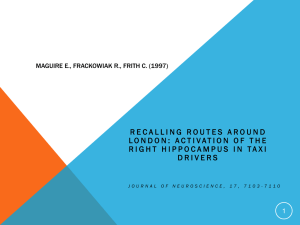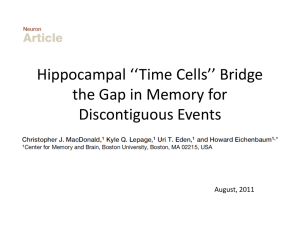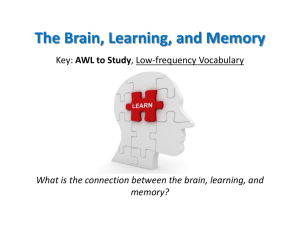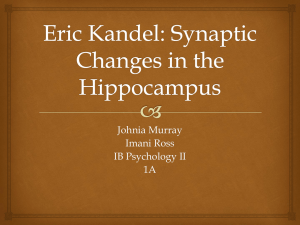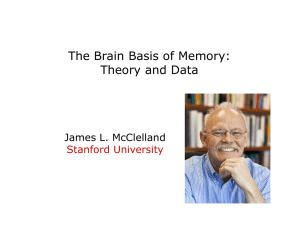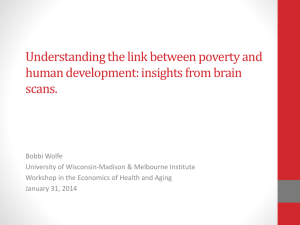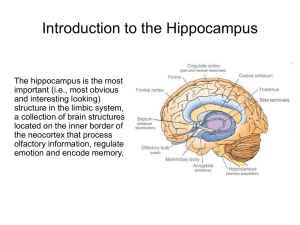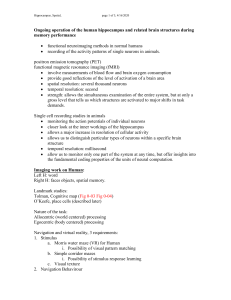Jose Belderbos radiotherapeut Emmy Lamers radiotherapeutisch
advertisement
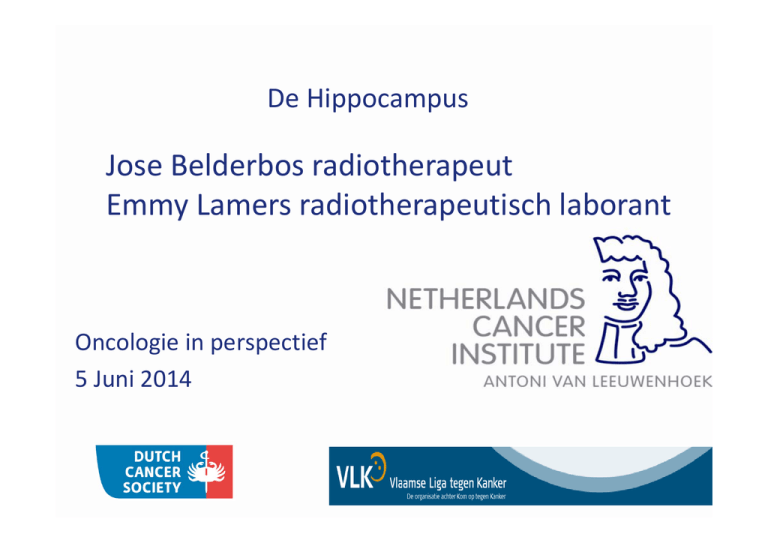
De Hippocampus Jose Belderbos radiotherapeut Emmy Lamers radiotherapeutisch laborant Oncologie in perspectief 5 Juni 2014 Limited disease SC (LD SC): Aupérin et al. NEJM 1999; 341:476‐484 PCI: Extensive disease SCLC (Slotman et al. NEJM 2007;357:664‐72) Prophylactic Cranial Irradiation Pro’s ‐ significant (2 fold) reduction of BM improvement QoL (?) ‐ marginal survival benefit ‐ LD 3 yrs survival 15.3 to 20.7% ‐ ED 5.4 to 6.7 months Con’s ‐ no 100% prevention of BM ‐ neuro cognitive toxicity Greene‐Schloesser et al. Frontiers in Oncology, 2012 The key‐role of the hippocampus First results HA‐WBRT RTOG 0933 in pts with brain mets • HA was associated with memory and quality of life preservation ‐ Pts with brain mets received HA‐WBRT of 30 Gy in 10 fractions ‐ The dose received by the hippocampus did not exceed 10 Gy ‐ The risk of developing a new metastasis in the hippocampus was 4.5%. ‐ 42 pts at 4 months post‐RT had a 7% decline in HVLT vs 30% decline in an historical control group (WBRT without HA) Gondi, presented at ASTRO 2013 and WLCC PCI Hippocampus Avoidance SCLC (LD and ED) PCI R •Does HA-PCI increase QoL? • 168 pts will be included •10 fractions up to 25 Gy full PCI HA-PCI • Monitoring cognitive sequelae : Neuro-cognitive tests 6 times: Baseline and 4/8/12/18/24 • Repeat MRI Study endpoints: Primary endpoint: • The total recall score of the Hopkins Verbal Learning Test–Revised assessed at 4 months after PCI. A decline in the total recall score of 5 points or greater will be considered a failure. Secondary endpoints: • Neurocognitive functioning and QOL, motor function • Assessment of structural and functional brain abnormalities • Incidence and location of brain metastases • Overall survival • Progression free survival • Biomarkers (neuro‐inflammation) The distribution of brain metastases around the hippocampus • 3% metas within 5mm of the hippocampus Gondi V Radiother Oncol 2010;95:327-331. Ghia A Int J Radiat Oncol Biol Phys 2007;68:971-977. • Occurrences of metas appears homogeneous • PCI effect proportional to coverage Relative volume/occurrence metastases Gondi N=1133 Ghia N=272 100 80 %Volume Gondi 60 Ghia 40 20 0 <5mm 5 to <10mm 10 to <15mm ≥ 15mm Distance from Hippocampus Total HA-PCI technique • • • • Irradiation of the brain (25 Gy), while sparing the hippocampus (as low as possible) Challenging! This requires a very steep dose gradient Definition of PTV?? – There is no GTV/CTV Then what about margins? – PTV = Brain – (Hippocampi + 5mm) Techniques for HA-PCI PTV Hippocampus V95 [%] Max ph. Dose [Gy] (α/β = 2 Gy) Mean BED [Gy] Helical Tomo 97.6 12.8 4.9 IMRT 96.9 15.3 7.3 Gondi V, et al., Hippocampal-Sparing Whole Brain Radiotherapy: A “How-To” Technique, Utilizing Helical Tomotherapy and LINAC-based Intensity Modulated Radiotherapy, International Journal of Radiation Oncology, Biology,Physics, doi:10.1016/j.ijrobp.2010.01.039 VMAT isodosen IMRT 38.0 Gy 33.0 30.0 Gy 30.0 29.0 Gy 29.0 27.0 Gy 27.0 12.0 Gy 12.0 Gy VMAT @NKI 38.0 Gy 30.0 Gy 33.0 29.0 Gy 30.0 27.0 Gy 29.0 12.0 Gy 27.0 12.0 Gy 38.0 Gy 30.0 Gy 33.0 29.0 Gy 30.0 27.0 Gy 29.0 12.0 Gy 27.0 12.0 Gy (Core) neuropsychological battery PRO:EORTC QLQ C30, QLQ BN20, QLQ‐LC13; EQD5; MOS Scale Motor function: neurological examination Characteristics of a neuropsychological test battery • • • • • • Repeatable (parallel forms, minimal practice effect) Good psychometric properties (in terms of reliability, validity, norms) Sensitive to changes in function Highly standardized, simple administration Able to be completed by most patients Measurement of relevant cognitive functions HVLT‐R Free Recall Trial 1 LEEUW SMARAGD PAARD TENT SAFFIER HOTEL GROT OPAAL TIJGER PAREL KOE HUT Trial 2 Trial 3 HVLT‐R Delayed recall LEEUW SMARAGD PAARD TENT SAFFIER HOTEL GROT OPAAL TIJGER PAREL KOE HUT HVLT‐R Recognition J N J N J N J N PAARD robijn GROT ballon koffie LEEUW huis OPAAL TIJGER boot sjaal PAREL HUT SMARAGD SAFFIER hond appartement cent TENT berg kat HOTEL KOE diamant TRAILMAKING A and B Trials A Trails B 20 Lexical fluency ‘’B” 01 ______________ 02 ______________ 03 ______________ 04 ______________ 05 ______________ 06 ______________ 07 ______________ 08 ______________ 09 ______________ 10 ______________ 11 ______________ 12 ______________ 13 ______________ 14 ______________ 15 ______________ 16 ______________ 17 ______________ 18 ______________ 19 ______________ 20 ______________ “D” ________________ ________________ ________________ ________________ ________________ ________________ ________________ ________________ ________________ ________________ ________________ ________________ ________________ ________________ ________________ ________________ ________________ ________________ ________________ ________________ “H” ______________ ______________ ______________ ______________ ______________ ______________ ______________ ______________ ______________ ______________ ______________ ______________ ______________ ______________ ______________ ______________ ______________ ______________ ______________ ______________ WAIS III DIGIT SPAN forward & backward 1‐7 6‐3 5‐8‐2 6‐4‐3‐9 …………… 7‐1‐3‐9‐4‐2‐5‐6‐8 2‐4 5‐7 6‐2‐9 4‐9‐6‐8 …………… 7‐2‐8‐1‐9‐6‐5‐3 WAIS III symbol substitution Lafayette’s pegboard Radiological assessment in HA‐PCI trial MRI brain: at baseline and at 4/12 months after PCI HA • • • • • 3D T1 – volumetry SD FLAIR – white matter hyperintensities DTI – microscopic white matter injury Resting state fMRI – neural activity/functional networks Susceptibility weighted imaging – cerebral mircobleeds Hippocampal volume • preservation of hippocampal volume measured by segmentation of the hippocampus on hi-res 3D MPRAGE scans Figure: sagittal slice of MPRAGE scan with segmentation of hippocampus in red Structural connectivity • preservation of nerve tracts connecting the hippocampus with other brain regions as measured with DTI tractography Figure: axial slice of MRI scan with tractography of uncinate fasciculus (from: Kurki et al., Journal of Magnetic Resonance Imaging, 2013 Functional connectivity • (partial) preservation of functional connectivity of hippocampus with other brain regions as measured with resting state fMRI prefrontal and parietal regions showing functional connectivity with the hippocampus during rest as measured with fMRI (from: Wible et al., Frontiers in Human Neuroscience, 2012 Recently started WBRT mice 11 Behavior 18 Sham 7 Immunocytochemistry 36 animals 11 Behavior 18 Radiation 7 Immunohistochemistry Day -14 0-4 14 22-29 31 32 35-39 42-44 Activity Arrival Irradiation Transport VU Automated home cage Open field NLR/ NOR Barnes maze Fear conditioning Adult (11 weeks of age) male C57BL/6j mice (Charles River, France) Xrad 225Cx HA-PCI in mice Developed by Princess Margaret Hospital (PMH, Toronto) in collaboration with Precision X-ray Inc (PXI, USA) conclusions • Neurocognitive problems after PCI or WBRT • Hippocampus plays a key-role • HA-PCI is feasible with small underdosage • HA-PCI phase III trial is acruiing aknowledgement NKI‐AvL Amsterdam Sanne Schagen Michiel de Ruiter Willem Boogerd Eugene Damen Judi van Diessen Harm van Tinteren Anke van Mourik Casper Carbaat Katrien de Jaeger Frederike Koppe Pietje Muller‐Timmermans Margriet Kwint KUL Leuven Dirk de Ruysscher Sabine Deprez Stefan Sunaert Frank van den Heuvel Johan Vansteenkiste Yolande Lievens Katrien Vandecasteele Rik Achten Paul Meijders Chirs Goor Paul Parizel Matthew Holt

